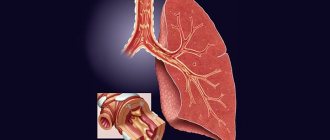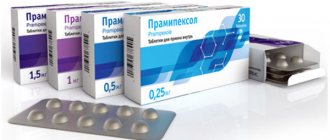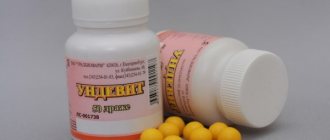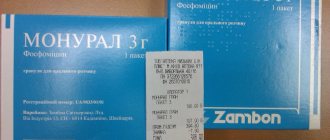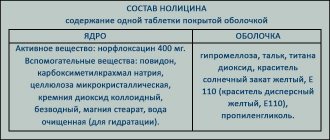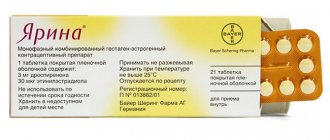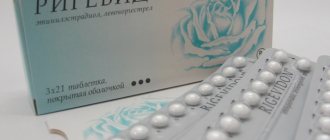Compound
The active ingredients in Janine include 2 mg of dienogest and 30 mcg of ethinyl estradiol .
In addition to these substances, the tablets contain lactose in the form of monohydrate, potato starch, magnesium stearate, talc, and gelatin. The shell is made using sucrose, dextrose, macrogol 35000, calcium carbonate , polyvidone, titanium dioxide, carnauba wax.
Pharmacodynamics and pharmacokinetics
The action of the pill is aimed at inhibiting the secretion of gonadotropic pituitary hormones, inhibiting the maturation of follicles and suppressing ovulation . With the use of the drug, the viscosity of the mucus filling the cervical canal increases, which creates obstacles for the penetration of sperm into the uterine cavity.
Taking Janine pills is accompanied by normalization of the menstrual cycle , a decrease in the pain of menstruation and the intensity of discharge, thereby significantly reducing the risk of developing anemia .
Dienogest , the progestin component of the drug, is a derivative of nortestosterone . Clinical studies of the use of this substance in patients with acne have established its pronounced antiandrogenic activity. In addition, dienogest is characterized by the ability to increase the concentration of high-density drugs in the blood.
After p/os administration of 1 tablet, dienogest is quickly and completely absorbed from the gastrointestinal tract . Plasma concentration reaches a maximum after 2 hours 30 minutes. The absolute bioavailability indicator is at the level of 96% (and this value remains the same in combination with the estrogenic component of Janine tablets).
About 1/10 of the administered dose of dienogest remains in the plasma in free form, the remaining 90% is nonspecifically bound to albumin . The substance does not bind to specific transport proteins. And this is precisely the reason that it does not displace cortisol and testosterone from their connections with CSG and SHBG, respectively.
The effect of the first passage is negligible. The resulting metabolic products are inactive.
The half-life of dienogest with a single dose is about 9 hours, with multiple doses - about 10. After oral administration, a little more than 85% of the dose is eliminated within 6 days (about half during the first day).
After p/os administration, ethinyl estradiol is quickly and completely absorbed from the digestive tract; the maximum plasma concentration is achieved in the next 1.5-4 hours after taking one tablet.
The substance is subject to the first passage effect, which accounts for its low bioavailability (this figure usually does not exceed 44%).
In free form, about 1.5% ethinyl estradiol , approximately 98.5% of the substance is bound to albumin . Ethinyl estradiol enhances the biosynthesis of CSG and SHBG without binding to these transport proteins .
After taking one tablet, the half-life of ethinyl estradiol is 10 hours. After three cycles of using the drug, it increases to 15 hours.
From 30 to 50% of metabolic products are excreted in the urine, about 30-40% are excreted in the intestinal contents.
Contraindications
Contraindications to the use of birth control pills are:
- thrombosis of veins and arteries (including a history; including PE, DVT, myocardial infarction , cerebrovascular disorders );
- conditions preceding thrombosis (including a history; for example, angina pectoris attacks of focal or cerebral disorders associated with cerebral circulation
- diabetes mellitus occurring with vascular complications ;
- severe and/or multiple factors that increase the risk of thrombosis of veins or arteries ;
- severe forms of liver disease (including a history; taking the drug is allowed only if the liver test results are normal);
- liver tumors;
- malignant diseases of the mammary glands or reproductive organs (as well as suspicion of them) caused by an imbalance of hormones
- vaginal bleeding of unspecified etiology;
- established or suspected pregnancy ;
- hypersensitivity to substances contained in the tablets.
The body's response to taking Janine
Janine contains hormonal substances, so it is taken exclusively orally and washed down with plenty of water. This allows you to increase the rate of dissolution of the pills and accelerate the absorption of the drug into the body.
Drinking water after swallowing tablets prevents the tablet from sticking to various parts of the esophagus. After the tablets dissolve in the digestive tract, the active substance of the drug is absorbed into the bloodstream and after 2-3 hours its concentration in the blood increases to its maximum. After entering the blood through the blood vessels of the small intestine, the drug binds to serum proteins that are part of the blood elements, most often with albumin, and is delivered to the organs of the reproductive system.
The drug is completely eliminated from the body within two days, and therefore, to maintain good concentrations, it is necessary to take the drug at the same time every day. A decrease in the concentration of hormones in the blood can reduce the contraceptive effect.
Side effects of Janine
The most common side effects of taking estrogen-progestin oral contraceptives are:
- an increase in the size and tension of the mammary glands, their soreness, as well as the appearance of discharge from them;
- bloody discharge from the genital tract of varying intensity (can be spotting or have the character of breakthrough bleeding);
- headaches (migraine attacks are also possible);
- mood lability;
- change in libido ;
- deterioration of tolerance to contact lenses;
- visual impairment;
- abdominal pain;
- nausea;
- skin rashes;
- vomit;
- changes in the nature of vaginal discharge;
- nodular (nodous) or erythema multiforme ;
- cholestatic jaundice;
- generalized itching;
- weight fluctuations;
- fluid retention;
- allergic reactions.
Sometimes side effects of Zhanine are expressed in the form of increased plasma concentrations of triglycerides , diarrhea , increased fatigue, decreased tolerance to carbohydrates, chloasma (the risk of focal hyperpigmentation is especially high in women who chloasma during pregnancy).
Like other combined hormonal contraceptives for oral use, Janine can cause thrombosis or thromboembolism .
When should you not take Janine?
The most dangerous side effect of Janine is the formation of blood clots, their movement in the body, which, if they enter the pulmonary system, can cause thromboembolism. There are women's health conditions in which it is strictly forbidden to use Janine. Diseases that are contraindications for taking contraceptives include:
- allergic reaction;
- pathology of the blood coagulation system;
- past diseases: myocardial infarction, cerebral stroke, pulmonary embolism, thrombophlebitis of the vessels of the lower extremities, vascular thrombosis, varicose veins;
- the presence of chronic diseases: angina pectoris, diabetes mellitus in the stage of decompensation, cases of transient ischemic attacks;
- migraine, especially in combination with focal neurological symptoms;
- diabetes mellitus and its complications;
- a health condition in which the risk of thromboembolic disease is very high: obesity, sedentary lifestyle, frequent long-term airplane travel, addiction to alcohol, smoking;
- hypertension with high blood pressure numbers;
- surgical interventions that are accompanied by immobilization of one part of the body for longer than 3-5 days;
- persistent lipid metabolism disorders;
- liver diseases that cannot be corrected by diet;
- high risk of cancer;
- severe pathology of the body's hormonal system;
- instability of the menstrual cycle of unknown etiology;
- possible pregnancy;
- lactation period.
Contraceptive pills Janine, instructions for use (Method and dosage)
Zhanine tablets are intended for regular use; violation of the standard regimen of use provokes intermenstrual bleeding , and also reduces the contraceptive and therapeutic effectiveness of the drug.
According to the instructions for use, Janine is taken daily with water in the order indicated on the package. One cycle consists of 21 days of taking the pills and 7 days off, during which (usually on the 2nd or 3rd day) the woman begins menstrual-like bleeding . Sometimes withdrawal bleeding does not stop until you start taking pills from a new package.
How to take Janine tablets for the first time?
If in the previous month a woman did not protect herself with hormonal drugs , then they begin to drink pills from the 1st day of the menstrual cycle (on the first day of bleeding). barrier contraceptives should be used for a week after taking the first pill .
How to take the drug correctly when switching from other contraceptives?
When switching from other combined hormonal drugs, pills should be taken the next day after the last tablet with the active substances of the previous drug is taken.
The appointment must begin no later than:
- the next day after the standard one-week break (if the woman used a drug containing 21 tablets);
- the next day after taking the last pill - “placebo” (if package No. 28 is used).
When switching from a progestin drug (implant, mini-pill , injectable contraceptives), tablets begin to be taken without interruption:
- on any day, if the transition is made from a mini-pill;
- from the day when the next injection was planned, if the transition is made from contraceptives in injections;
- on the day of implant removal.
barrier contraceptives should be used in the first week of taking Janine tablets .
Rules for admission after childbirth or abortion
After termination of pregnancy in the first 13 weeks, the drug can be started immediately. Additional contraception is not needed.
After termination of pregnancy between 14 and 27 weeks, and also if the pregnancy ends in childbirth, taking the pills begins for 21-28 days. If the first pill is taken later, barrier contraceptives .
If sexual relations took place between taking the drug and childbirth/abortion, before taking Zhanine you should exclude the possibility of pregnancy or wait until your first period.
How to take pills if you miss them?
The missed pill should be taken as soon as possible, the next one from the package should be taken at the usual time. A delay of less than 12 hours does not reduce the contraceptive effect of the drug.
The breaks between taking tablets should not be more than 7 days, since it is within 7 days of continuous use of the drug that adequate suppression of the functional activity of the hypothalamic-pituitary-ovarian .
If the delay exceeds 12 hours in the first 14 days of taking the drug, the next pill is taken immediately when remembered (even if this involves taking 2 pills at the same time). Barrier contraceptives should be used for the next 7 days .
The greater the number of tablets missed and the closer the missed period is to the standard weekly break, the higher the woman’s risk of becoming pregnant.
If a delay of more than 12 hours occurred from days 15 to 21 of taking the drug, the next pill must be taken immediately when remembered (even if this involves taking 2 pills at the same time).
In the future, the reception is continued as usual and at the same time. In the next 7 days after missing, you should use barrier contraceptives. In addition, you will need to start taking pills from a new package immediately when the previous one ends, i.e. without taking a seven-day break.
Typically, withdrawal bleeding in this case does not begin until the second pack is completed. However, the possibility of spotting and even breakthrough bleeding cannot be ruled out.
The absence of withdrawal bleeding after missing pills during the seven-day period free from taking Janine is a reason to assume pregnancy.
Vomiting within three to four hours after taking the pills reduces the absorption of the active substances of the drug. In this case, you must follow the recommendations when skipping pills.
If a woman does not plan to change her usual dosage regimen, it is recommended to take additional pills from the next package if necessary.
To delay the onset of cyclic bleeding, the drug is continued to be taken continuously using a new package. You can take pills from a new pack for as long as the woman wants (until the pack runs out). At this time, spotting and breakthrough bleeding are possible.
Reception from the next pack begins after a week's break.
How long can I take Janine? If the drug is well tolerated, it can be used for as long as the need for contraception remains.
Janine and endometriosis
The exact cause of endometriosis has not been established; it is only known that hormonal imbalance . The effectiveness of the drug for endometriosis is determined by its mechanism of action.
In the second phase of the cycle after ovulation, there is intense preparation of the organs of the reproductive system for pregnancy, one of the manifestations of which is the growth of the uterine mucosa.
Janine prevents the release of the egg from the ovary (that is, ovulation), and, therefore, reduces the severity of post-ovulation changes in the endometrium of the uterus .
Why are tablets prescribed for endometriosis?
In accordance with the instructions, the effect of the drug Janine is aimed at relieving pain, normalizing the disrupted cycle, reducing the intensity of bleeding, that is, eliminating the symptoms that are the main (although not the only) ones for endometriosis .
The release of blood during menstruation is normally due to the fact that the mucous membrane formed in the second half of the cycle is rejected, and the blood vessels are damaged. Since Janine suppresses ovulation, the endometrium does not grow so actively, and accordingly, the surrounding tissues do not become inflamed and do not compress the nerve trunks.
In addition, like any hormonal drug , the drug allows you to normalize the cycle, making it strictly periodic.
How to take for endometriosis?
Janine is effective for both genital and extragenital (outside the genital organs) endometriosis . The components of the drug exhibit high activity in the body, which allows them to be used in the lowest possible dose.
Several regimens for the use of the drug Janine for endometriosis . At the same time, the doctor must select treatment individually for each woman.
In some cases, it is considered advisable to drink pills in accordance with the contraceptive regimen: one per day, from the first day of the cycle. After three cycles of “ 21 days of admission + 7 days of break, ” the patient should undergo tests for blood clotting, monitor the condition of endometriosis , and also evaluate the functional state of the liver using a biochemical blood test.
It is also possible to take the drug according to a prolonged regimen, according to which the pills should be taken continuously for 63 or 84 days in a row, and then take a week's break.
In addition to the direct effect of the active components of the drug on tissues and organs, with this treatment regimen the drug reduces the number of menstrual bleedings (instead of 3-4, one usually passes), which also has a beneficial effect on the patient’s condition.
Reviews from doctors about Janine for endometriosis indicate the high effectiveness of the drug. Their statements are also confirmed by the results of numerous studies and practical experience: according to statistics, the use of the drug can achieve positive results in approximately 85% of cases.
In addition, experts note that Janine is well absorbed in the body (its bioavailability is 90%) and rarely provokes side effects.
Effect of tablets for women after 40 years
The female body, after the age of 40, performs its reproductive function only by 10%.
However, this does not prevent women of this age from taking contraceptives. According to studies, about 30% of women of this age ovulate during their menstrual cycle. Pregnancy often has pathologies. Termination of pregnancy or abortion at this age can lead to disastrous consequences for the woman’s body, to menopausal syndrome or the development of cancer.
Women over 40 years of age who have experienced early menopause take the drug Janine to regulate the menstrual cycle, protect bone tissue, and for the treatment and prevention of urological diseases.
Women over the age of 40 who are susceptible to severe PMS with periodic ovulation, uterine bleeding, and heavy discharge during menstruation require additional examination. The doctor must decide whether treatment with Janine is acceptable on an individual basis or whether drug replacement with hormonal therapy is necessary.
Contraceptives are easily tolerated, protect against unplanned pregnancy, remove signs of menopause, and have a preventive effect on cancer of the female genital organs.
If a woman is not at risk for health reasons (smokers, with blood diseases, obesity and diseases of the cardiovascular system), then she can take Zhanine tablets until she reaches 50 years of age.
Interaction
The simultaneous use of Zhanine birth control pills with drugs that induce microsomal enzymes of liver cells (including barbiturates , hydantoins , Rifampicin , Carbamazepine , Primidon and, probably, Topiramate , Griseofulvin , Felbamate ), provokes an increase in the clearance of dienogest and ethinyl estradiol , which may cause a decrease in contraceptive effect.
As a rule, the maximum activity of liver enzymes is observed 2-3 weeks after the start of treatment with these drugs, however, it can be observed over the next 4 weeks after completion of the course.
When Zhanine is used in combination with ampicillin and tetracycline of ethinyl estradiol decreases .
It should be remembered that women who take any of the above-mentioned drugs for a short course should additionally use barrier contraceptives throughout the entire period of treatment and for 7 days after its completion.
If a woman is undergoing treatment with Rifampicin , the need to use additional contraceptive measures continues for a full 4 weeks after its completion. If concomitant therapy is started at the end of taking a package of hormonal tablets, the next one should be started without taking the usual break.
special instructions
The use of the drug Zhanine is contraindicated before the onset of menarche and after the onset of menopause .
In some cases, the use of sex hormones can cause the development of tumors in the liver . liver size , severe abdominal pain, as well as signs of intraperitoneal bleeding must be taken into account when making a differential diagnosis.
Taking the drug Janine may be accompanied by irregular bleeding (both in the form of spotting and breakthrough bleeding), especially in the first months of therapy. In this regard, assessment of irregular bleeding should be carried out only after an adaptation period of approximately 3 cycles.
If such bleeding recurs or occurs after previous regular cycles, a non-hormonal cause should be sought. Diagnosis is carried out to exclude the presence of a malignant neoplasm or pregnancy . In some cases, diagnostic curettage may be required.
Janine does not protect against STDs and HIV infection.
Overdose symptoms
An overdose of Janine is extremely rare in medical practice, but still it cannot be completely excluded from the list of possible conditions. When taken correctly, an overdose is impossible, since the drug is eliminated from the body almost completely within 48 hours.
In some diseases, an overdose is still possible. These include glomerulonephritis and pyelonephritis, renal amyloidosis, polycystic kidney disease, chronic hepatitis, fatty liver hepatosis, chronic cholecystitis in the stage of decompensation and other diseases that cause changes in the organs of the gastrointestinal tract and genitourinary system of a woman. Symptoms of Janine overdose begin gradually, and often women do not associate them with taking the drug. Specific symptoms of an overdose will be nausea, occasional vomiting, and abdominal pain.
To eliminate an overdose, it is necessary to stop taking the drug. Overdose symptoms are very similar to other diseases. You need to contact a specialist who, upon examination, will make sure that this condition is caused by an overdose, and will prescribe the necessary treatment.
Analogs
Level 4 ATC code matches:
Ovidon
Rigevidon
Non-Ovlon
Mercilon
Yarina Plus
Yarina
Miniziston 20 fem
Novinet
Microgynon
Lindineth
Cyclo-Proginova
Regulon
Logest
Midiana
Belara
Femoden
Jess Plus
Jess
Zoely
Generics: Zhenetten , Diecyclen , Siluet , Bonade .
Analogues of Zhanin by mechanism of action: Belara , Yarina , Dailla , Midiana , Jess , Logest , Evra , Lindinet 30 , Mercilon , Marvelon , Egestrenol , Femoden , Oralcon , Dimia .
Janine or Silhouette - which is better?
The drugs Zhanine and Silhouette are structural analogues, that is, they contain identical substances in the same dosage as active components, they have the same mechanism of action, indications and contraindications.
The products are produced by different companies and have a significant difference in price; Silhouette is about half the price of its counterpart.
Which is better: Claira or Janine?
The basis of the drug Qlaira is dienogest and estradiol valerate of 17β-estradiol produced by the human body ). Each package contains 5 types of tablets, which differ in the composition of the active ingredients and their concentration.
The ethinyl estradiol contained in the Janine dragee exhibits greater metabolic stability in contrast to the estrogenic component of Qlaira , however, it also has a more pronounced effect on the liver .
The mechanism of action of Qlaira is due to the ability of its active components to suppress ovulation and change the properties of cervical mucus. In addition, the drug reduces pain and intensity of bleeding during menstruation , prevents the development of iron deficiency anemia , and reduces the risk of developing ovarian and endometrial cancer .
Which is better: Janine or Diana 35?
Diane-35 is a combination of cyproterone (2 mg) and ethinyl estradiol (35 mcg). If Zhanine is prescribed primarily to prevent pregnancy in women with endometriosis , then the use of Diane-35 is advisable for contraception in women with pronounced signs of androgenization .
Janine or Visanne - which is better?
The drug Visanne of micronized dienogest as an active component . The drug is intended for the treatment of endometriosis. To achieve a therapeutic effect, the tablets are taken for six months.
The main indication for use of the drug Zhanine is contraception (in particular contraception in women with endometriosis ).
According to doctors and patients who were treated with both drugs, treatment of endometriosis with Janine is not always as effective as treatment with Visanne. In addition, the latter is often better tolerated and causes fewer side effects.
When wondering which drug to choose, you should remember that each woman’s body is individual, in addition, in each specific case, the indications for use may differ. In this regard, a specialist must prescribe this or that remedy.
Mechanism of action of the drug
The effectiveness of treating endometriosis with Zhanine is determined by its chemical composition. Dienogest has gestagenic-antiandrogenic activity, and ethinyl estradiol inhibits the production of gonadotropic hormones by the pituitary gland.
The therapeutic effects are due to the following actions of active substances on the female body:
- The ovulation processes in the ovaries are inhibited, and the production of estrogen in the female body decreases.
- The concentration of androgens in a woman’s blood decreases.
- The growth and development of endometrioid cells is suppressed.
- Foci of endometriosis decrease in size and then completely atrophy.
- The “block” includes enzymes responsible for the synthesis of prostaglandins OG E2 (the main mediators of pain and inflammatory reactions). As a result, the woman is no longer haunted by painful sensations.
- The active substances that make up Janine stimulate the breakdown of estrogens, making them inactive.
- The body's immune defense is activated, which contributes to the destruction of endometriotic lesions.
- New blood vessels that would feed pathogenic foci of endometriosis cease to form in the tissues.
- The number of growth factors that can stimulate the proliferation of endometrial cells in atypical locations decreases.
- The peristalsis of the fallopian tubes is suppressed, which prevents the egg from moving through them. More mucus accumulates in the cervix, which impairs the passage of sperm through it.
- The structure of the endometrium in the uterus changes, making it impossible for the embryo to attach to it.
The last two points relate to the contraceptive properties of the drug.
Use with alcohol
In the instructions for the drug, the manufacturer does not give any recommendations regarding the possibility of using Janine tablets with alcoholic beverages.
The recommended dose of alcohol for a woman taking oral contraceptives is 20 grams of ethanol (a glass of wine).
However, please remember that:
- the reaction of different organisms to the same dose of alcohol may differ;
- hormonal drugs are an additional burden for the liver , which is responsible for the breakdown of ethyl alcohol (i.e., with an overdose of alcohol, the consequences can be quite serious both for the liver and for the body as a whole);
- with increased activity of liver enzymes due to an overdose of alcohol, the breakdown and elimination of substances contained in the drug are significantly accelerated (i.e., the contraceptive effect may be reduced);
- An overdose of alcohol, accompanied by vomiting, leads to the fact that the active substances of the tablets do not have time to be absorbed from the gastrointestinal tract, and as a result, the effectiveness of the drug decreases.
According to doctors, you should wait at least 3 hours between taking pills and alcoholic drinks.
During pregnancy
In the course of epidemiological studies, it was found that Janine does not increase the risk of teratogenic effects in a child whose mother took birth control pills before pregnancy or, unknowingly, in the first weeks.
However, during pregnancy, taking the drug is contraindicated.
Since combined hormonal drugs are characterized by the ability to suppress lactation and affect the composition of breast milk, nursing women are advised to refrain from taking them.
If you are planning a child, you should stop using birth control pills. Doctors advise trying to get pregnant from the beginning of a new cycle. Pregnancy usually occurs fairly quickly after taking the pills.
If you don’t have your period after taking the pills
If taking birth control pills Janine has led to the cessation of menstruation, the woman must undergo a comprehensive diagnosis, including: a blood test for sex hormones and thyroid hormones, and an ultrasound examination of the pelvic organs.
Janine is a remedy that prevents ovulation and thickens cervical mucus. Not heavy periods are a consequence of taking the drug. Menstruation may periodically stop with continuous use of the drug. In the absence of other factors, stopping your period while taking the drug is not harmful.
Irregularities in the frequency of menstruation may occur at the initial stage of taking the drug. This is due to suppression of the hormonal function of the ovaries. The duration of the discharge and its intensity may also change.
If after three months of taking the drug your menstrual schedule has not improved, you should consult a doctor to solve this problem. If the drug is suitable for a woman, then within three months the cycle will return to normal and will be 28 days.
We also invite you to watch a video about the dangers and benefits of birth control pills:
Reviews about Janine
Reviews about Janine on the forums are quite varied. For the most part, they are positive, since the drug is well tolerated by women, is easy to use, and copes well with its main task.
In addition, patients and doctors in reviews of Janine note that the drug, in addition to contraception, has a number of other positive side effects: it helps with acne, normalizes the menstrual cycle, and reduces the intensity and pain of bleeding. In women who stop taking Zhanine tablets due to a desire to become pregnant, pregnancy after discontinuation of the drug often occurs within the first 2-3 cycles.
Due to the drug's ability to stabilize hormonal levels and suppress foci of pathological growth of the endometrium , it is often effective for fibroids and endometriosis (usually in situations where the disease is not too advanced).
However, there are also negative reviews about the drug, which are associated either with the lack of results in the treatment of endometriosis , or with side effects that significantly worsen the woman’s quality of life. Experts are inclined to believe that such phenomena can occur if the product was selected without taking into account contraindications for use, or is simply not suitable for a particular woman.
Analyzing doctors' reviews of Zhanine birth control pills, we can conclude that experts speak positively about this drug. Such a high rating is due to the fact that, being a low-dose drug, the latter has a pronounced contraceptive effect, helps restore hormonal imbalances and has a positive effect on the general condition of a woman.
Janina price, where to buy
The price of Janine birth control pills depends on which pharmacy sells them. How much a drug costs in pharmacies is influenced by the cost of transportation and the pricing features of a particular pharmacy chain. Considering that the pills are produced by only one pharmaceutical company, there is no difference between a more expensive and a cheaper drug.
The price of Zhanin in Ukrainian pharmacies is on average 215 UAH (for package No. 21).
The cost of a package containing 21 tablets in Russian pharmacies is approximately more than 870 rubles. You can buy a package of 63 dragees for approximately 2,200 rubles.
- Online pharmacies in RussiaRussia
- Online pharmacies in UkraineUkraine
- Online pharmacies in KazakhstanKazakhstan
ZdravCity
- Janine dragee 63 pcs. Bayer Weimar/Bayer Pharma
RUB 2,343 order - Janine dragee 21 pcs. Bayer Weimar GmbH and Co.KG
916 RUR order
Pharmacy Dialogue
- Janine (other No. 21) Bayer
RUB 1,073 order
- Janine (other No. 21x3) Bayer
RUB 2,401 order
show more
Pharmacy24
- Janine No. 21 tablets Bayer Weimar GmbH & Co.
KG, Nimechchyna 223 UAH. order
PaniPharmacy
- Janine tablets Janine etc. No. 21 Germany, Bayer Weimar
253 UAH order
show more


